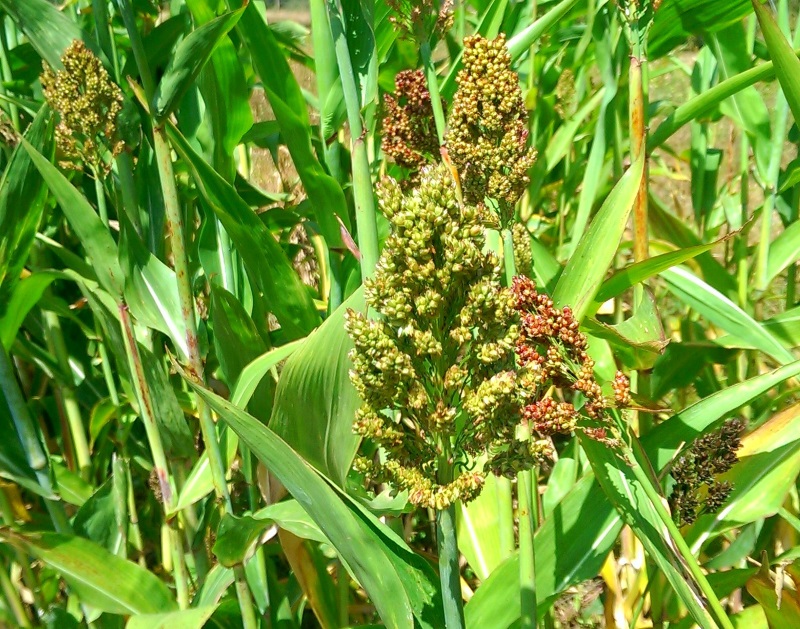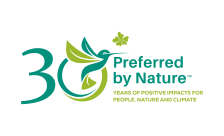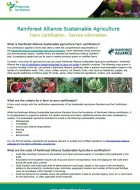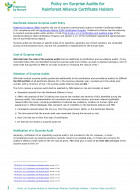Join the responsible farm products market and unlock new opportunities by earning the Rainforest Alliance certification. Gain access to new markets and customers who prioritise sustainability.
More than two million farmers, farm workers and their families directly benefit from Rainforest Alliance certification. Farmers say that meeting the criteria helps them farm intelligently, grow their businesses, gain confidence, get ahead and plan for their futures.
Rainforest Alliance Certified™ farms meet the comprehensive standard of the Rainforest Alliance Sustainable Agriculture Standard, which addresses social, economic and environmental criteria. Certified farms are awarded the Rainforest Alliance Certified™ seal, a prestigious badge that can be used to market products grown on certified farms or cattle operations.
Preferred by Nature certifies farms and organisations that adhere to the Rainforest Alliance Sustainable Agriculture Standard Farm requirements. As part of our programme, we also provide pre-assessment services. For more information, access our Rainforest Alliance Sustainable Agriculture fact sheet here.
If you need a price quote
Which agricultural products can be certified?
Over 90 agricultural crops can be certified according to the Rainforest Alliance Sustainable Agriculture Standard. The crops included are chili, cocoa, coffee, coconut, cut flowers, fruits, nuts (such as hazelnuts), pepper, tea, while special additional conditions apply for herbs, spices, other herbal tea ingredients, rooibos, and vegetables.
The Rainforest Alliance maintains a list of authorised Certification Bodies in countries where Certification Bodies have been approved for Rainforest Alliance Farm and/or Rainforest Alliance Supply Chain scopes. This is granted following the Certification Bodies' requests of geographic approval, which includes providing risk and law assessments for that specific country.
Is there a market for Rainforest Alliance Certified products?
The term "sustainable” has seeped into the public consciousness as shorthand for all the things that we do to fight poverty and pollution, and protect the Earth's resources for the benefit of the next generation. Smart shoppers everywhere are increasingly demanding groceries from sustainably managed farms and looking for ecolabels that verify the source of these goods. Trendsetting food companies and supermarkets want to know more about how their products were grown—where and by whom—and with what social and ecological consequences.
There is a growing consensus that certification is an effective way to ensure the establishment and enforcement of management practices that protect the environment, the rights of workers, and the interests of local communities. Already seen in countless markets, cafes, restaurants, and offices around the world, the Rainforest Alliance Certified seal is widely recognized as a leading symbol of sustainability.
What are the costs of Rainforest Alliance farm certification?
Below you can see an overview of the costs associated with Rainforest Alliance Sustainable Agriculture certification.
Costs:
- Audit Fees
- Audit fees include honoraria to the auditors and other technical experts or translators that participate in the audit.
- Associated travel expenses include cost of ground and air transportation, food and lodging for the audit team during the audit days covered.
- Audit duration and audit team shall be determined per audit basis, based on the scope of the certification, relative to the product(s), production area, total area, geographic location and number of farms and facilities (such as processing units) included in the scope.
- Audit fee discounts are possible where the audited organization is able to provide lodging, food, air or land travel for the audit team, or other applicable travel expenses.
Certification decision
- Fees include review of the audit report, conducted by approved reviewers, independent from the audit process.
Certificate administration and engagement management
- Administrative fees are covered for audit planning, certification management, database management and certificate issuance. Other services of access to the Rainforest Alliance Marketplace, use of seal, and customer service are also included.
- Honoraria for administrative staff and office costs and utilities are also covered
Does Rainforest Alliance certification require a farm to be organic?
Organic agriculture is an important, worldwide movement to make farms productive without the use of synthetic pesticides and fertilizers. The 2020 pesticide management requirements of the Rainforest Alliance Sustainable Agriculture Standard are based on a robust integrated pest management approach. This regulation includes the prohibition of pesticides covered by the WHO/FAO framework of Highly Hazardous Pesticides, the prohibition of obsolete substances and specific risk management requirements for an additional set of active ingredients.
Rainforest Alliance certification approaches farming in a holistic manner, and it has demonstrated that its criteria offers a realistic and effective way for farms of all sizes to move toward a reduction in agrochemical use.
What are the criteria for a farm to obtain certification? 
To earn certification, a farm must comply with the certification requirements of the 2020 Rainforest Alliance Sustainable Agriculture Standard and its related Rules and Policies.
While the Rainforest Alliance Sustainable Agriculture Standard forms the foundation of Rainforest Alliance certification, it is complemented by supportive policies. For certain countries and topics, additional policies have been developed as needed. The Sustainable Agriculture Standard is rooted in the following sustainability principles:
- Management
- Traceability
- Natural Resource Conservation
- Income and Shared Responsibility
- Farming
- Social
- Environment
To find all updated policies, standards an guidance relevant to audited and certified operations, please visit the Rainforest Alliance Resource Library.
To begin your certification process and receive a service quote, fill in our service request form or contact us. We will provide clarifications guiding you on the scope of certification that best fits your needs and company set-up.





